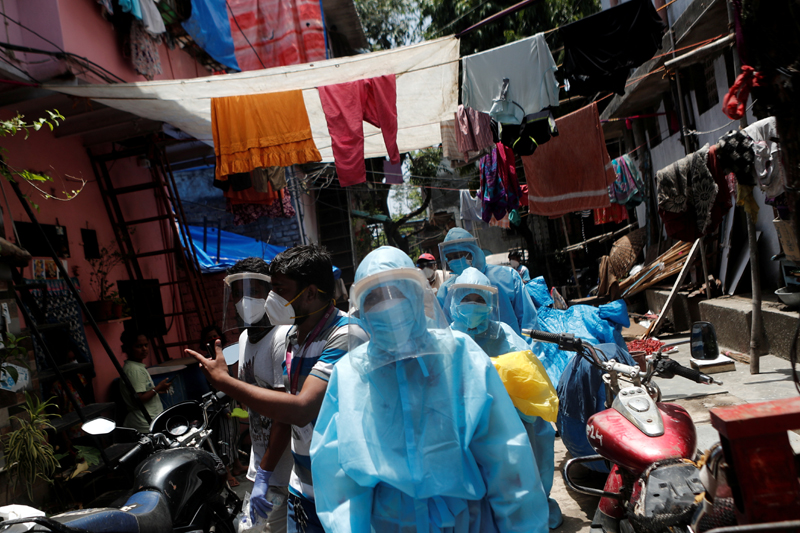Beijing's daily cases drop, India's rise sharply
BEIJING: China's capital Beijing reported a decline in newly confirmed cases of coronavirus Thursday as the city continued to press stricter measures to contain a new outbreak.
A total of 158 people have been confirmed as infected since the new outbreak was detected last week at the Xinfad wholesale market, a Beijing city government spokesman said. Close contacts were being traced to locate all possible cases as quickly as possible amid strengthened testing and other prevention and control measures, Hu Hejian said Thursday.
Anyone who has been near the market since May 30, along with their close contacts, will be quarantined at home for 14 days and tested at least twice, city government official Zhang Ge said.
The city has closed its borders to all confirmed cases, suspected cases, patients with fever and close contacts from abroad and other provinces, Zhang said. China already has barred most foreigners from entering the country and even foreign diplomats arriving from abroad must under two weeks of isolation at home, he said.
All indoor public venues, including clubhouses and party rooms in apartment complexes, will remain closed, Zhang said. Offices, restaurants and hotels in high-risk area will be shut down, he said. Flights at the city's two airports have already been cut by half.
Beijing reported 21 cases on Thursday, down from 31 on Wednesday. The national total of 28 new cases included four brought by Chinese travellers from outside the country and three in the city of Tianjin and Hebei province, both of which border Beijing.
No new deaths were reported, leaving the total number of fatalities at 4,634 amid 83,293 cases recorded since the virus was first detected in the central city of Wuhan late last year.
Meanwhile, U.S. Secretary of State Mike Pompeo urged China to reveal all it knows about the coronavirus outbreak that is believed to have originated in the country. Pompeo with the ruling Chinese Communist Party's top diplomat, Yang Jiechi, in Hawaii on Wednesday.
Pompeo "stressed the need for full transparency and information sharing to combat the ongoing COVID-19 pandemic and prevent future outbreaks," the State Department said in a statement.
In other developments in the Asia-Pacific region:
— India recorded its the highest one-day increase of 12,281 coronavirus cases, raising the total caseload to 366,946, but the government rules out reimposing a countrywide lockdown. India's total deaths reached 12,237, a rise of 334 in the past 24 hours, according to a Health Ministry statement on Thursday. Prime Minister Narendra Modi rejecting a new lockdown, saying the country has to think about further unlocking and minimizing all possibilities of harm to people. The lockdown that was imposed nationwide on March 25 is now restricted to high-risk areas. When it was imposed, jobless labourers stranded in India's big cities were left to walk great distances to their home villages, a migration that left them without food and risked spreading the virus further.
— South Korea reported 59 cases as infections continue to steadily rise in the greater capital area. The figures announced by South Korea's Centers for Disease Control and Prevention on Thursday brought the national caseload to 12,257, including 280 deaths. It said 39 of the new cases came from Seoul and its metropolitan area, where health authorities have been scrambling to stem transmissions amid increased economic activity and eased attitudes on social distancing. Eight of the new cases were linked to international arrivals. Health officials have raised concern that the resurgence of the virus in China would also lead to an increase in imported cases. South Korea requires two-week quarantines of all passengers arriving from abroad.
— New Zealand reported one additional case, in a traveller who was quarantined after arriving from Pakistan. New Zealand appears to have eliminated community transmission of the virus but has confirmed three in recent arrivals. Also, New Zealand's economy shrank by 1.6% during the first three months of the year, although that drop is likely to be dwarfed in the second quarter. Figures released by Statistics New Zealand capture the first week of the virus lockdown, which lasted more than two months. Nevertheless, the drop in GDP was the largest in 29 years and confirmed the nation is in a recession. The figures compare GDP in the first quarter with the preceding quarter. Under a different measure, which compares GDP in the first quarter with the same quarter in 2019, the economy shrank by 0.2%.
— Two universities in Australia's capital plan to fly in 350 foreign students as Australia's lucrative international education sector reopens after the pandemic lockdown. Australian National University and Canberra University expect the chartered aircraft to fly the students from Singapore in late July. The students would go into hotel quarantine on arrival and will likely be the first foreign students to return to Australian campuses. Tourism Minister Simon Birmingham says it's "more likely" that Australia won't allow general international travel before next year. International education has been Australia's most lucrative export after mining.
— Hong Kong Disneyland on Thursday opened its doors to visitors for the first time in nearly five months, at a reduced capacity and with social distancing measures in place. The theme park closed temporarily at the end of January due to the coronavirus outbreak, and is the second Disney-themed park to re-open worldwide, after Shanghai Disneyland. Small groups of visitors had lined up before the park's opening hours, and Mickey and Minnie Mouse characters drove by in a large taxicab and waved at the eager crowd waiting to enter.






